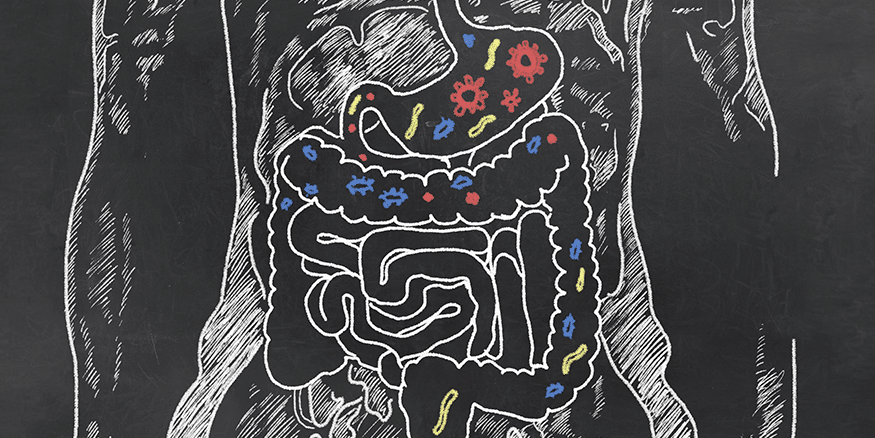
Is Your Gut Microbiota Balanced or Not?
The gut microbiota is a vast and diverse reservoir of microorganisms, including bacteria, fungi, and viruses, which live in relative balance in healthy individuals. Scientists have identified at least 1,000 different species of bacteria living within our digestive tract, primarily the colon. However, studying how these species individually and collectively affect our overall health is difficult because the majority of species cannot be cultured with standard methods in the lab.
Research shows that gut microorganisms benefit us by producing vitamins, preventing the growth of harmful bacteria, training the immune system, and fermenting unused food (energy substrates). When the microorganisms within the microbiota live in relative balance, this state is called normobiosis. However, when this balance is upset, because one or more microorganisms has grown out of proportion to the other species, this results in a state of gut dysbiosis.
Normal gut microbiota composition varies widely among individuals, so defining dysbiosis and its effects on disease is challenging. Accomplishing this could eventually allow modern medicine to find and correct dysbiosis in patients, perhaps even preventing the occurrence of disease.
Some bacteria are pro-inflammatory and others are anti-inflammatory but have different effects on various diseases. For example, the microbial signature of the Firmicutes bacteria species present in the intestinal tract in patients with Crohn’s disease differs significantly in patients with ulcerative colitis, yet both are closely related inflammatory bowel diseases.1 When compared with Crohn’s patients in long-term remission, those with relapsing Crohn’s have lower levels of all Firmicutes species.2
Researchers have found a direct link between dysbiosis and a number of other conditions including irritable bowel syndrome (IBS), celiac disease, obesity, type I and II diabetes, depression, and autism.3 Investigation into the gut microbiota as it relates to disease continues to show that imbalances in the microbiota can result in gut disorders. However, one of the biggest challenges that remains is developing an accurate, standardized approach to identifying and characterizing dysbiosis’ incremental effects on disease and relapse.
The Genetic Analysis Map (GA Map™) Dysbiosis Test
In an article published in 2015 in Alimentary Pharmacology and Therapeutics, a team of European researchers introduced a new algorithmic test that uses DNA probes to identify and characterize dysbiosis in fecal samples to recognize the genetic profiles of specific bacterial species.4 This study is of particular interest because of the different nature of dysbiosis in gut conditions – IBS is a functional condition while Crohn’s disease and ulcerative colitis are organic inflammatory diseases, yet both show gut dysbiosis.
Casen et al. established a profile of normobiosis through the sampling of fecal matter from 668 adults aged 17-76, 69% of whom were women. This group comprised 297 healthy volunteers who were the controls, 236 patients with IBS, including all sub-types, and 135 with IBD, including both Crohn’s disease and ulcerative colitis. They then designed special DNA probes to recognize typical bacterial imbalances associated with dysbiosis in IBS and IBD, as identified by previous studies. After computer and laboratory (in vitro) testing, the researchers settled on a final panel of 54 probes covering species in these dominant intestinal bacteria taxonomies: Firmicutes, Proteobacteria, Bacteroidetes, Actinobacteria, Tenericutes, and Verrucomicrobia.
The researchers created a Dysbiosis Index (DI) algorithm to provide a numeric representation of the degree of dysbiosis, based on deviation from normobiosis. They determined that a DI of >2 qualified as clinically-relevant dysbiosis. The researchers detected dysbiosis in 73% of IBS patients, 70% of treatment-naive IBD patients, and 80% of those with IBD in clinical remission. However, they detected dysbiosis in only 16% of the controls.
The Future of Medicine?
The GA Map™ test results support a new paradigm about dysbiosis and disease. By using deviation from an established profile of normobiosis to indicate disease and relapse, Casen et al. offer hope for a breakthrough way to personalize treatment for those diagnosed with IBS and IBD. Researchers hope that this finding will lead to further development of individual therapeutic treatment plans that work to restore intestinal microbiota balance.
While the researchers are optimistic that clinicians can use their Dysbiosis Index model to reveal disease state, their study has some limitations. Firstly, by using mainly Scandinavian subjects to establish a profile of normobiosis, it limits the scientific community’s understanding of a healthy gut to a specific demographic. Secondly, the researchers’ use of high-throughput sequencing as a tool for analyzing gut bacteria meant that they used only a small part of the bacterial 16S rRNA gene to explore the vast array of bacteria in the gut. Their model does not identify some of the less dominant species in the microbiota, which could still play a vital role, and offers only a small snapshot of the vast array of microorganisms.
Nonetheless, this study is the first clinical test identifying and characterizing dysbiosis based on fecal specimens and it holds potential for treatment of gastrointestinal and other conditions. If other researchers across the globe can replicate this process with different ethnicities and produce similar results, then future treatment regimens could be very different from those used today.















